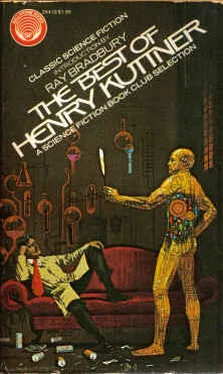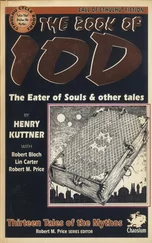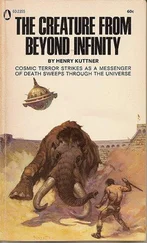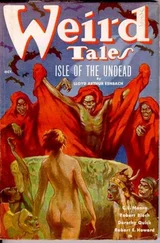The faces fell away on both sides and he went through a door without any awareness of opening it.
He was in the Street. Sweat bathed him and the air struck icy, though it was not a cold day. He looked blindly left and right, and then plunged for a bank of phone booths half a block away, the image of Hartz swimming before his eyes so clearly he blundered into people without seeing them. Dimly he heard indignant voices begin to speak and then die into awestruck silence.
The way cleared magically before him. He walked in the newly created island of his isolation up to the nearest booth.
After he had closed the glass door the thunder of his own blood in his ears made the little soundproofed booth reverberate. Through the door he saw the robot stand passionlessly waiting, the smear of spilled food still streaking its chest like some robotic ribbon of honor across a steel shirt front.
Danner tried to dial a number. His fingers were like rubber. He breathed deep and hard, trying to pull himself together. An irrelevant thought floated across the surface of his mind. I forgot to pay for my dinner. And then: A lot of good the money will do me now. Oh, damn Hartz, damn him, damn him!
He got the number.
A girl’s face flashed into sharp, clear colors on the screen before him. Good, expensive screens in the public booths in this part of town, his mind noted impersonally.
“This is Controller Hartz’s office. May I help you?”
Danner tried twice before he could give his name. He wondered if the girl could see him, and behind him, dimly through the glass, the tall waiting figure. He couldn’t tell, because she dropped her eyes immediately to what must have been a list on the unseen table before her.
“I’m sorry. Mr. Hartz is out. He won’t be back today.”
The screen drained of light and color.
Danner folded back the door and stood up. His knees were unsteady. The robot stood just far enough back to clear the hinge of the door. For a moment they faced each other. Danner heard himself suddenly in the midst of an uncontrollable giggling which even he realized verged on hysteria. The robot with the smear of food like a ribbon of honor looked so ridiculous. Danner to his dim surprise found that all this while he had been clutching the restaurant napkin in his left hand.
“Stand back,” he said to the robot. “Let me out. Oh, you fool, don’t you know this is a mistake?” His voice quavered. The robot creaked faintly and stepped back.
“It’s bad enough to have you follow me,” Danner said. “At least, you might be clean. A dirty robot is too much-too much—” The thought was idiotically unbearable, and he heard tears in his voice. Half-laughing, half-weeping, he wiped the steel chest clean and threw the napkin to the floor.
And it was at that very instant, with the feel of the hard chest still vivid in his memory, that realization finally broke through the protective screen of hysteria, and he remembered the truth. He would never in life be alone again. Never while he drew breath. And when he died, it would be at these steel hands, perhaps upon this steel chest, with the passionless face bent to his, the last thing in life he would ever see. No human companion, but the black steel skull of the Fury.
It took him nearly a week to reach Hartz. During the week, he changed his mind about how long it might take a man followed by a Fury to go mad. The last thing he saw at night was the street light shining through the curtains of his expensive hotel suite upon the metal shoulder of his jailer. All night long, waking from uneasy slumber, he could hear the faint creaking of some inward mechanism functioning under the armor. And each time he woke it was to wonder whether he would ever wake again. Would the blow fall while he slept? And what kind of blow? How did the Furies execute? It was always a-faint relief to see the bleak light of early morning shine upon the watcher by his bed. At least he had lived through the night. But was this living? And was it worth the burden?
He kept his hotel suite. Perhaps the management would have liked him to go, but nothing was said.
Possibly they didn’t dare. Life took on a strange, transparent quality, like something seen through an invisible wall. Outside of trying to reach Hartz, there was nothing Danner wanted to do. The old desires for luxuries, entertainment, travel, had melted away. He wouldn’t have traveled alone.
He did spend hours in the public library, reading all .that was available about the Furies. It was here that he first encountered the two haunting and frightening lines Milton wrote when the world was small and simple-mystifying lines that made no certain sense to anybody until man created a Fury out of steel, in his own image.
But that two-handed engine at the door. Stands ready to smite once, and smite some more…
Danner glanced up at his own two-handed engine, motionless at his shoulder, and thought of Milton and the long-ago times when life was simple and easy. He tried to picture the past. The twentieth century, when all civilizations together crashed over the brink in one majestic downfall to chaos. And the time before that, when people were different, somehow. But how? It was too far and too strange. He could not imagine the time before the machines.
But he learned for the first time what had really happened, back there in his early years, when the bright world finally blinked out entirely and gray drudgery began. And the Furies were first forged in the likeness of man.
Before the really big wars began, technology advanced to the point where machines bred upon machines like living things, and there might have been an Eden on earth, with everybody’s wants fully supplied, except that the social sciences fell too far behind the physical sciences. When the decimating wars came on, machines and people fought side by side, steel against steel and man against man, but man was the more perishable. The wars ended when there were no longer two societies left to fight against each other. Societies splintered apart into smaller and smaller groups until a state very close to anarchy set in.
The machines licked their metal wounds meanwhile and healed each other as they had been built to do. They had no need for the social sciences. They went on calmly reproducing themselves and handing out to mankind the luxuries which the age of Eden had designed them to hand out. Imperfectly of course. Incompletely, because some of their species were wiped out entirely and left no machines to breed and reproduce their kind. But most of them mined their raw materials, refined them, poured and cast the needed parts, made their own fuel, repaired their own injuries and maintained their breed upon the face of the earth with an efficiency man never even approached.
Meanwhile mankind splintered and splintered away. There were no longer any real groups, not even families. Men didn’t need each other much. Emotional attachments dwindled. Men had been conditioned to accept vicarious surrogates and escapism was fatally easy. Men reoriented their emotions to the Escape Machines that fed them joyous, impossible adventure and made the waking world seem too dull to bother with. And the birth rate fell and fell. It was a very strange period. Luxury and chaos went hand in hand, anarchy and inertia were the same thing. And still the birth rate dropped.
Eventually a few people recognized what was happening. Man as a species was on the way out. And man was helpless to do anything about it. But he had a powerful servant. So the time came when some unsung genius saw what would have to be done. Someone saw the situation clearly and set a new pattern in the biggest of the surviving electronic calculators. This was the goal he set: “Mankind must be made self-responsible again. You will make this your only goal until you achieve the end.”
Читать дальше







